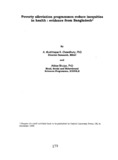| dc.contributor.author | Chowdhury, A Mushtaque R | |
| dc.date.accessioned | 2019-11-14T08:27:13Z | |
| dc.date.available | 2019-11-14T08:27:13Z | |
| dc.date.issued | 1999 | |
| dc.identifier.citation | Chowdhury, A. M. R. (1999). Poverty alleviation programmes reduce inequities in health : evidence from Bangladesh*. Research Reports (1999): Health Studies, Vol - XXVIII, 278–307. | en_US |
| dc.identifier.uri | http://hdl.handle.net/10361/12965 | |
| dc.description.abstract | Over the previous two decades many poverty alleviation programmes have been
implemented in developing countries. Evaluation of such programmes have
traditionally looked at their success in increasing the income levels of
participants but less on the broader goals of human well-being. This chapter
looks a~ the poverty alleviation programme of BRAe, a large non-governmental
organization in Bangladesh, and, based on a scientifically designed study,
presents its impact on selected components of 'human well-being'.
The study found better child survival and nutritional status in households
served by the programme. Similar impacts were also found in other areas such
as expenditure pattern, family planning practice and children's education. The
likely influence of 'selectively bias ' on the above results is also discussed | en_US |
| dc.language.iso | en | en_US |
| dc.publisher | BRAC Research and Evaluation Division (RED) | en_US |
| dc.subject | Poverty alleviation | en_US |
| dc.subject | Health | en_US |
| dc.subject | BRAC | en_US |
| dc.subject.lcsh | Poverty--Bangladesh. | |
| dc.subject.lcsh | Poverty reduction and growth facility. | |
| dc.title | Poverty alleviation programmes reduce inequities in health : evidence from Bangladesh* | en_US |
| dc.type | Research report | en_US |

